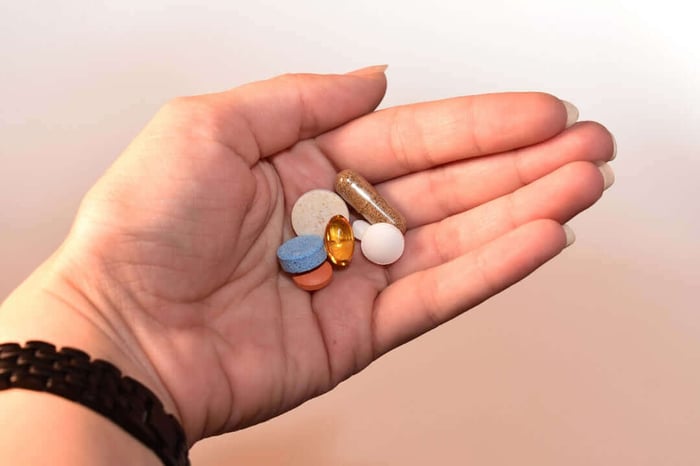Prebiotics and probiotics are both essential for gut health, but the truth is they play quite different roles in the digestive system. And while we can get both of them from the food we eat, they also both come in supplement form.
If you suffer from digestive issues, you may already be taking probiotics. They’re often recommended by doctors and pharmacists and they’re easy to get over-the-counter.
But what about prebiotics? Should you be taking them too?
Can you take prebiotics and probiotics together to boost your gut microbiome even more?
Let’s explore the topic and find the answers so you can move forward and start improving your gut health even more.
What’s the Difference?
They look and sound almost the same, but probiotics and prebiotics are two very separate organisms. Here’s a quick rundown on what each one is so you know the difference.

Probiotics
Probiotics are living organisms in your digestive tract, from mouth to intestine.
They’re the good bacteria in your gut, the soldiers that fight off bad bacteria and maintain harmony in your gut environment.
Aside from probiotic supplements, fermented food like yogurt, kefir, and sauerkraut are some of the best sources of probiotics you can find.
Every mouthful adds strong, healthy bacteria to your gut to help maintain the peace!
Prebiotics
Prebiotics are fibers that our digestive system typically can’t absorb. But they’re excellent food for the living probiotics in your gut, giving them the strength to fight off harmful bacteria that enter.
They’re found in vegetables and whole grains, so every time you eat a fiber-rich food, you’re feeding the good bacteria in your own system.
They also come in prebiotic supplements, which help to promote the growth of probiotic bacteria in your gut.
Can You Take Prebiotics And Probiotics Together?
You can take prebiotics and probiotics together, but there’s a right way and a wrong way to do it! Different bacteria prefer different types of food (just like humans).
Taking any old probiotic with any old prebiotic might seem logical, but ultimately it’s not going to be helpful at all if you're feeding your probiotics the wrong food!
This is where many users go wrong. It’s quite tricky to pair the right probiotics with the right prebiotics.
Thankfully, you can now buy a combination of both, specifically designed in the right quantities and with the right combination.
These combination prebiotic/probiotic supplements are known as synbiotics.
They’ve already been formulated in ideal doses with the right strains, so you don’t need to worry about accidentally rendering one of your supplements useless!
The Best Synbiotic Combo: Click Here Now to Check It Out
Benefits of Taking Prebiotics and Probiotics Together
There are a few specific health benefits you can expect when you take prebiotics and probiotics together. Here are the biggest ones:
Probiotics Last Longer
Probiotics can only be effective if they survive the journey from when you ingest them until they reach your gut.
They need to be strong enough to handle stomach acid, bile, and other harsh chemicals along the way.
Only once they’ve arrived in your gut can they begin doing what they’re designed to do.
It can also take a while to populate your gut naturally with beneficial probiotics.
Probiotic supplements speed up this process, as you can take exactly the right probiotic strains in the exact right amounts daily.
However, if you choose to go that route, studies have shown it takes up to 3-6 months for probiotics alone to recolonize your gut bacteria with the more beneficial species. [1]
When you take probiotics and prebiotics together, the probiotics are fortified by the prebiotics.
This makes them stronger, giving them a much higher chance of taking root in your gut.
Think of it like this: The prebiotics are the fertilizer for the "garden" in your gut, and the probiotics are the "plants" you want to grow.
The "plants" (probiotics) will grow without fertilizer (prebiotics), but the fertilizer helps them grow better.
Taking probiotics and prebiotics together allows both the probiotics and prebiotics to reach the gut, where they can grow much more easily together.
Boosted Gut Health
If half the probiotics you’re taking are perishing on the way down, you’re not getting the full benefit of the supplement.
However, with the addition of prebiotics, there’s a much higher chance of the probiotics doing their job and doing it well.
Improved Overall Health
Did you know that around 90 to 95% of the body’s serotonin is actually made in the gut?
Serotonin is a neurotransmitter and mood regulator, so this means that when you’re in a good mood, it doesn’t come from your brain—it comes from your gut bacteria!
And mood isn’t the only thing that’s affected by your gut bacteria.
Your immune system health is largely dependent on the state of your gut health.
If your gut health improves, so does your immune response!
There are tons of related beneficial effects of taking probiotics and prebiotics together that scientists are just beginning to figure out.
Are There Side Effects?
There’s just one thing to be wary of when taking prebiotics and probiotics together:
If you’re taking prebiotics on their own, you’ll also need to be careful of this, as it’s really a side effect of the prebiotics and not the probiotics.
Remember, prebiotics are food for probiotics.
But this means that when you ingest them, they don’t only feed the good bacteria—they can be food for certain types of bad bacteria too.
Typically the bad bacteria in your gut feeds on sugars, carbs, and other "saccharides."
But some strains of bad bacteria can feast on certain prebiotics as well.
That's why the specific blend of prebiotics and probiotics matters.
Brand New: The Best (Doctor-Recommended) Probiotic on the Market
If you’re taking prebiotics on their own, strengthening the bad bacteria could be a possibility.
Usually, if you’re taking the right prebiotics and probiotics together, the good bacteria will be strong enough to fight off the bad bacteria in your gut, though.
But the other potential issue comes in when the prebiotics feed the probiotics a little too well and bacterial overgrowth occurs.
Even too much good bacteria in your gut microbiome can contribute to gassiness, bloating, irritable bowel syndrome, and cramping.

The Best Probiotic and Prebiotic to Start With
So, can you take prebiotics and probiotics together?
Absolutely, if you do it the right way.
Don’t expect to just buy two random supplements over the counter and for them to work well together.
Your best bet is to find a great synbiotic blend, which already has dosages and strains worked out for you.
And here's the best synbiotic blend I've found so far:
It's a combination of this probiotic supplement formulated with the help Dr. Steven Masley...
And this prebiotic blend also formulated with Dr. Steven Masley's assistance.
Who is Dr. Steven Masley?
Why he's the best-selling author behind half-a-dozen books about health and wellness...
He's a trained chef who specializes in "good for you" recipes...
And he's a M.D. who's been on the cutting edge of gut health for years.
We worked with Dr. Masley to formulate the best probiotic and prebiotic out there...
And these are specially designed to work together for a "synbiotic" effect.
Simply click on the link that you want to learn more about below:





